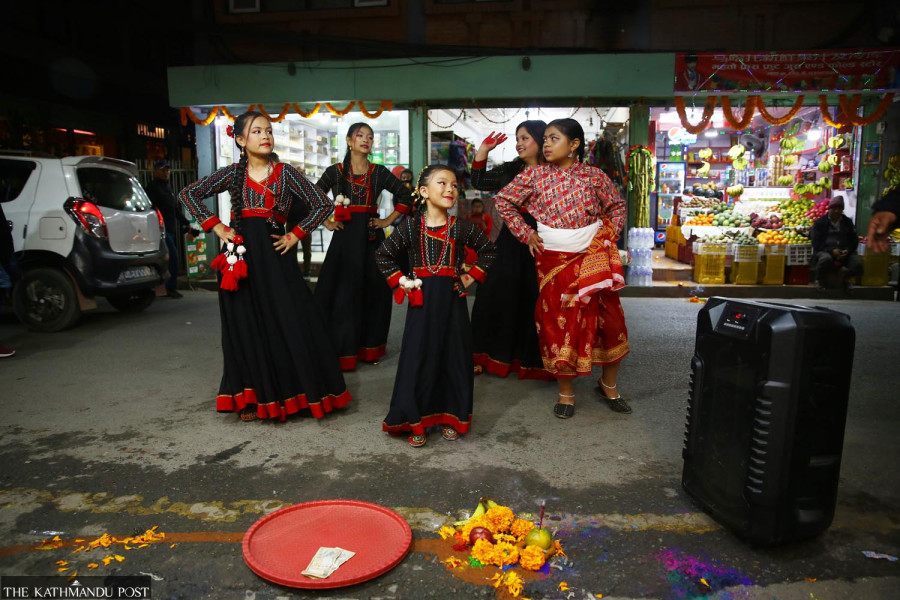Culture & Lifestyle
Are we losing the essence of Deusi-Bhailo?
With loudspeakers playing contemporary hits instead of traditional chants, many worry that the spirit of Deusi-Bhailo is being overshadowed by a focus on entertainment over community connection.
Rishika Dhakal, Sanskriti Pokharel & Timila Maharjan
Whenever Sushmita Chaulagain, 21, from Banepa, thinks of Tihar, two things come to her mind—the lights and Deusi-Bhailo. For her, the latter is about fun and entertainment, a time to dance to any tune, Bollywood or otherwise. But after talking to her mother and grandmother, she noticed that, in their time, Deusi-Bhailo was a deeply devotional event, a celebration where people sang Bhajans and even older community members joined in, using traditional instruments like the Khaijadi (a type of tambourine used in festivals, dances, and chants).
Samrat Sharma, 40, from Kathmandu, believes Deusi-Bhailo is linked more closely to rural life than urban life. “This can be observed in the song’s lyrics, ‘Rato mato, Chiplo bato,’ (red mud, slippery road) reflecting its rural origin where red muds were plastered in houses and balconies.”
Though Deusi-Bhailo is now celebrated in urban and rural areas, Sharma believes the sense of belonging and solidarity remains much stronger in villages. Sharma thinks that global changes, such as the influence of the market and technology, have affected all cultural practices, shifting their significance from communal celebration to individual expression, including Deusi-Bhailo. “Nowadays, item songs and viral dances gain more popularity. This focus on entertainment and individual expression has diminished the importance of traditions,” he says.
With globalisation and migration weakening traditional family ties and community connections, people have prioritised their identity over collective experiences. “Because of this, the way Deusi-Bhailo is celebrated nowadays reflects individual preferences rather than a shared communal heritage, which has played its role in diminishing a sense of belonging and solidarity among people,” adds Sharma.
Bharat Das, 34, from Guransh, Dailekh, says, “Deusi-Bhailo has changed completely. Now, it’s mostly just a speaker playing music. In the past, we would sing and dance to folk songs, but today, people are dancing to rap, Hindi item songs, and tracks like ‘Areli Kadaile Malai Chwassai’ and ‘Paisa’. These songs are popular and appeal to young people, but they don’t capture the true spirit of Deusi-Bhailo. It feels more like a way to raise money for tours or entertainment rather than a way to spread festive love and warmth within the community.”
This problem has arisen because youths are less aware of the purpose behind playing Deusi-Bhailo. Therefore, educating them about celebrating it correctly is crucial to saving its essence. Festivals should connect souls and unite people, not become a medium of extravaganza.
Jeebika Sapkota, 21, from Sundarharaincha-12-Morang, says, “The most cherished part of Tihar has always been Deusi-Bhailo.” In the bygone days, for Sapkota, it was an experience filled with joy, reflecting the cultural roots and community spirit. However, today, Sapkota feels the essence of Deusi-Bhailo is fading away as loud sound systems replace the soulful sounds of instruments. It prevents the beauty of traditions.
Sapkota laments that houses, too, are now decorated with electric bulbs and disco lights rather than the warm glow of oil lamps. In the name of celebration, there is a growing competition for bursting firecrackers and explosives, overshadowing Tihar's serene and joyous atmosphere.
Sapkota adds, “I've noticed a striking difference between celebrating Tihar in villages and urban areas. In villages, Deusi-Bhailo groups are united, with girls in Chaubandi Cholo (traditional women’s clothing) and boys in Daura Suruwal (traditional men’s clothing)—each carrying instruments and singing Deusi-Bhailo songs. This reflects the true soul of Tihar. But in cities, it's quite the opposite. People play Deusi-Bhailo primarily for money, forming small groups with loud sound buffers. In this way, the festive essence of our culture is slowly fading away.”
Shrijana Maharjan, 38, from Thecho, Lalitpur, recalls Tihar as a time of laughter, music, and dancing with friends as they went around the community playing Deusi-Bhailo. “We had a close-knit group of friends with whom we’d play Deusi-Bhailo every year,” she shares.
Maharjan would start preparing for Deusi-Bhailo weeks in advance. She recalls, “Some of us would play instruments, while others would sing and dance. We each had our roles, and together we performed as a team. Since technology wasn’t as advanced back then, we created our own music. Occasionally, we’d play cassettes to dance along, writing down the lyrics on paper to sing together.”
These days, she enjoys watching young boys and girls dress up and perform well-rehearsed dances. But she misses the traditional ways of celebrating Deusi-Bhailo. She says, “It’s disheartening to see people playing loud music on speakers and dancing. It feels more like a casual party or feast than Deusi-Bhailo. Sometimes, the loud music even irritates me.”
Shrawan Upadhyaya Dahal, 24, from Charikot, Dolakha, remembers Deusi-Bhailo as a cherished part of his childhood. “On Laxmi Puja night, my siblings, some neighbourhood friends, and I would team up, spending weeks perfecting our performance to make it memorable,” he shares. For Dahal, Deusi-Bhailo was a magical time, offering the joy of exploring the neighbourhood at night and admiring the festive decorations. To ensure they wouldn’t forget the chants, he and his friends would write them down and practice thoroughly, aiming to deliver at least five minutes of performance at each house.
However, he believes Deusi-Bhailo is fading and losing its authenticity. “Where there used to be countless groups singing throughout the neighbourhood, now only a few visit each year,” he observes. Many of his friends have scattered, with some moving abroad, leaving only a few who cannot sustain the tradition independently. “These days, Deusi-Bhailo is often overshadowed by local concerts, and technology has changed how people celebrate,” he adds. “Many have forgotten the cultural importance of visiting each house in person, and every year, the number of people participating in Deusi-Bhailo seems to decrease.”
He emphasises that while modernisation brings convenience, it also distances us from the cultural roots that define Tihar. He says, “Maybe we should work to preserve and revive these traditions, sharing the joy and significance of Deusi-Bhailo with younger generations.” He hopes that future Tihars see a resurgence of the old ways so that the beauty and spirit of the festival can live on.




 9.7°C Kathmandu
9.7°C Kathmandu



.jpg&w=200&height=120)













